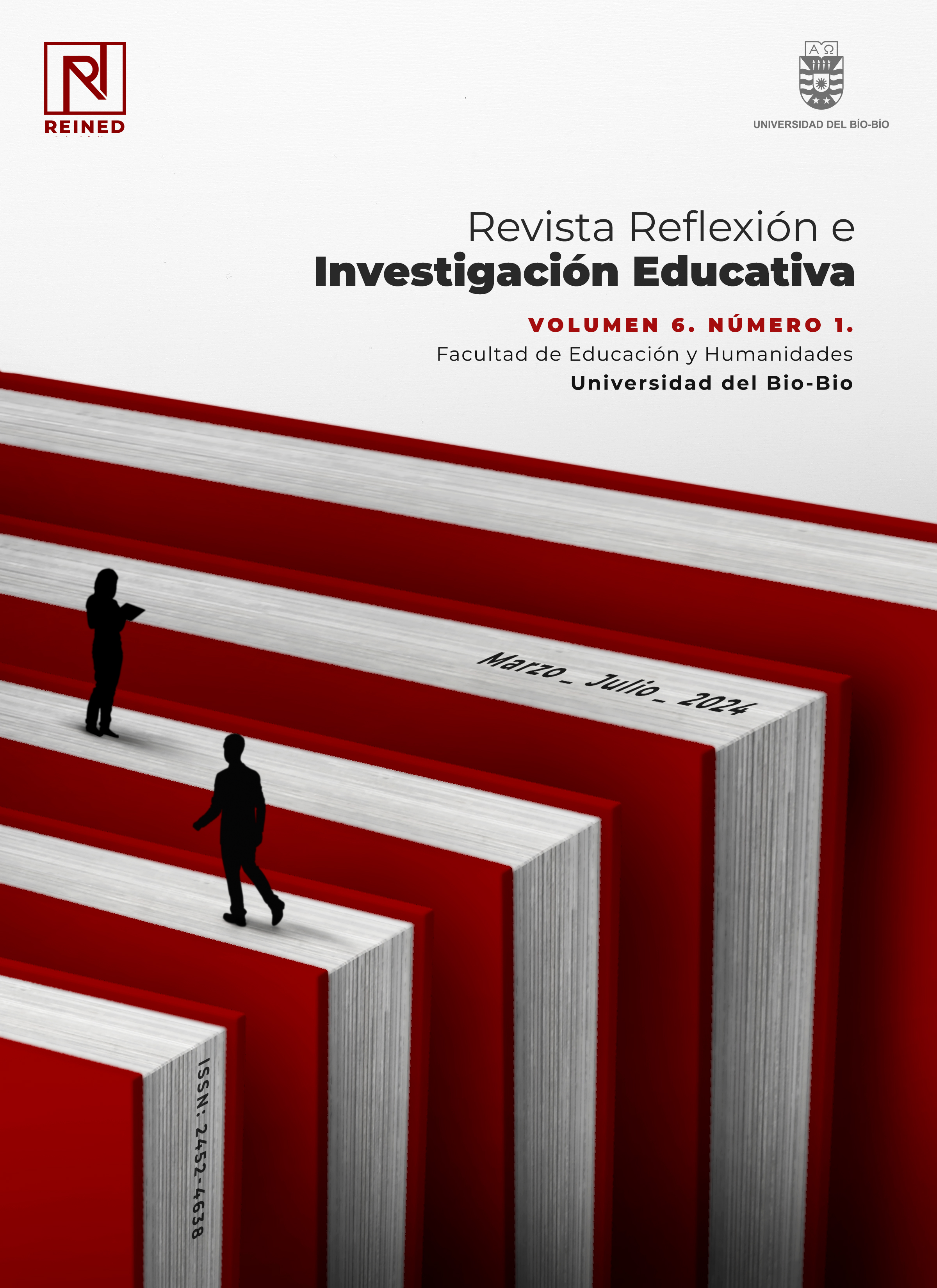INFLUENCE OF SOCIOEMOTIONAL COMPETENCIES IN THE DEVELOPMENT OF COMPETENCY-BASED TRAINING IN HIGHER EDUCATION STUDENTS
Main Article Content
Abstract
The influence of socioemotional competencies in the development of competency-based training in higher education students is relevant, since it is possible to create teaching strategies that favor and increase academic performance. It is for this reason that the objective of this work is to encourage reflection on the development of socioemotional competencies of teachers and their impact on competency-based education in higher education students. The fundamental reason for continuing research on this topic lies in the importance of providing quality education, based on competency-based training, and how this influences the development of competency-based training in higher education students, is analyzed from the Pentagonal Model of Emotional Competencies of Rafael Bisquerra, who states that emotional education is a construct that encompasses the integral formation of the person. Therefore, it should be a complement that responds to and addresses not only intellectual needs, but also social needs that are often relegated to the background in the academic environment.
Article Details
References
Armada, J., Montávez M., M. y González L., I. (2020). Influencia de la expresión corporal en el desarrollo de las habilidades socioafectivas en educación secundaria. Movimiento, 26, 1-19. DOI: 10.22456/1982-8918.104634 DOI: https://doi.org/10.22456/1982-8918.104634
Barahona, P. (2014). Factores determinantes del rendimiento académico de los estudiantes de la Universidad de Atacama. Estudios pedagógicos (Valdivia), 40(1), 25-39. DOI: 10.4067/S0718-07052014000100002 DOI: https://doi.org/10.4067/S0718-07052014000100002
Beltrán López, D. (2023). La profesión docente y las teorías implícitas sobre la enseñanza. Una reflexión crítica. QURRICULUM - Revista de Teoría, Investigación y Práctica Educativa, (32), 195-212. DOI: 10.25145/j.qurricul.2019.32.11 DOI: https://doi.org/10.25145/j.qurricul.2019.32.11
Bisquerra, R. (2005). La educación emocional en la formación del profesorado. Revista Interuniversitaria de Formación del Profesorado, 19(3), 95-114. https://dialnet.unirioja.es/servlet/articulo?codigo=2126758
Bisquerra, R. y Pérez, N. (2007). Las competencias emocionales. Educación XXI, 10, 61-82. https://www.redalyc.org/pdf/706/70601005.pdf DOI: https://doi.org/10.5944/educxx1.1.10.297
Bowen, J. (2008). Teorías de la Educación. Australia: LIMUSA.
Caballero-González, Y.A. y García-Valcárcel, A. (2020). Fortaleciendo el pensamiento computacional y habilidades sociales mediante actividades de aprendizaje con robótica educativa en niveles escolares iniciales. Píxel-BIT Revista de Medios y Educación, 58. 117-142. DOI: 10.12795/pixelbit.75059 DOI: https://doi.org/10.12795/pixelbit.75059
Díaz, S., Martínez, M. y Zapata, A. (2017). Rendimiento académico y calidad de vida relacionada con la salud en estudiantes de odontología. Revista Salud Uninorte, 33(2), 139-151. http://www.redalyc.org/articulo.oa?id=81753189008 DOI: https://doi.org/10.14482/sun.33.2.10540
Durlak, J. A., Weissberg, R. P., Dymnicki, A. B., Taylor, R. D. y Schellinger, K. (2011). The impact of enhancing students’ social and emotional learning: A meta-analysis of school-based universal interventions. Child Development, 82, 405-432. DOI: 10.1111/j.1467-8624.2010.01564.x DOI: https://doi.org/10.1111/j.1467-8624.2010.01564.x
Elias, M., Hunter, L. y Kress, J. (2001). Emotional Intelligence and Education. En Ciarrochi, J., Forgas, J. y Mayer, J. (2001). Emotional Intelligence in Everyday Life: A Scientific Inquiry. (pp. 133- 149). Psychology Press.
García Martínez, J. y González Sanmamed, M. (2020). Comunicación e interacción como aspectos clave de los entornos personales de aprendizaje: perspectivas de los estudiantes costarricenses de educación. Revista Electrónica Educare, 24(3), 100-119. DOI: 10.15359/ree.24-3.5 DOI: https://doi.org/10.15359/ree.24-3.5
García-Zapata, A. y Gaviria Cano, A.S. (2021). Creencias sobre las interacciones docente-estudiante en el aprendizaje colaborativo. Estudios pedagógicos (Valdivia), 47(3), 303-319. DOI: 10.4067/S0718-07052021000300303 DOI: https://doi.org/10.4067/S0718-07052021000300303
Goleman, D (1995). La inteligencia emocional. Vergara.
Goleman, D. (1999). La práctica de la inteligencia emocional. Kairós.
González, R. y Villanueva, L. (2014). Recursos para educar las emociones. De la teoría a la acción. Pirámide. DOI: https://doi.org/10.36576/summa.37258
Gross, J. (2014). Handbook of emotion regulation. Second Edition. The Guilford Press.
Lareu A. (1987) Social class differences in family school relationships: the importance of cultural capital. Sociology of Education, 60(2), 73-85. DOI: https://doi.org/10.2307/2112583
Montanares, E.G. y Junod López, P.A. (2018). Creencias y prácticas de enseñanza de profesores universitarios en Chile. Revista electrónica de investigación educativa, 20(1), 93-103. DOI: https://doi.org/10.24320/redie.2018.20.1.1383
Ohm, P. (1998). Emotional Intelligence. A different kind of smart. Teaching for success through an emotion-based mode. Trabajo de Maestría no publicado. Prescott College Digital Dissertations, Publicación N° AAT 1391459.
Pozo, J. I. (2009). Adquirir una concepción compleja del conocimiento: creencias epistemológicas y concepciones de aprendizaje. En J. I. Pozo y M. P Pérez Echeverría (Coords.), Psicología del aprendizaje universitario: La formación en competencias (pp. 70-86). Morata.
Salovey, P. y Mayer, J. D. (1990). Emotional intelligence. Imagination, Cognition, and Personality, 9, 185-211. DOI: https://doi.org/10.2190/DUGG-P24E-52WK-6CDG
Tejedor, F. y García-Valcárcel, A. (2007). Causas del bajo rendimiento académico del estudiante universitario (en opinión de los profesores y alumnos) Propuestas de mejora en el marco del EEES. Revista de educación, (342), 443-473.
https://redined.educacion.gob.es/xmlui/handle/11162/69006
Ticlla, F.R., Quijano, J.C.A., Arroyo, J.A.N. y Zavala, E.E.E. (2018). Las teorías implícitas sobre el aprendizaje de los docentes universitarios. Paradigma, 39(2), 301-315. http://revistaparadigma.online/ojs/index.php/paradigma/article/view/713
Zamora-Araya, J.A., Aguilar-Fernández, E. y Rodríguez-Pineda, M. (2023). ¿Cuándo el abandono universitario se convierte en exclusión educativa? Revista Innovaciones Educativas, 25(38), 97-115. DOI: 10.22458/ie.v25i38.4212 DOI: https://doi.org/10.22458/ie.v25i38.4212

